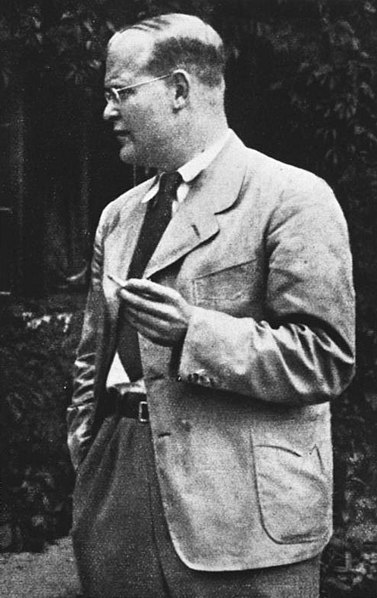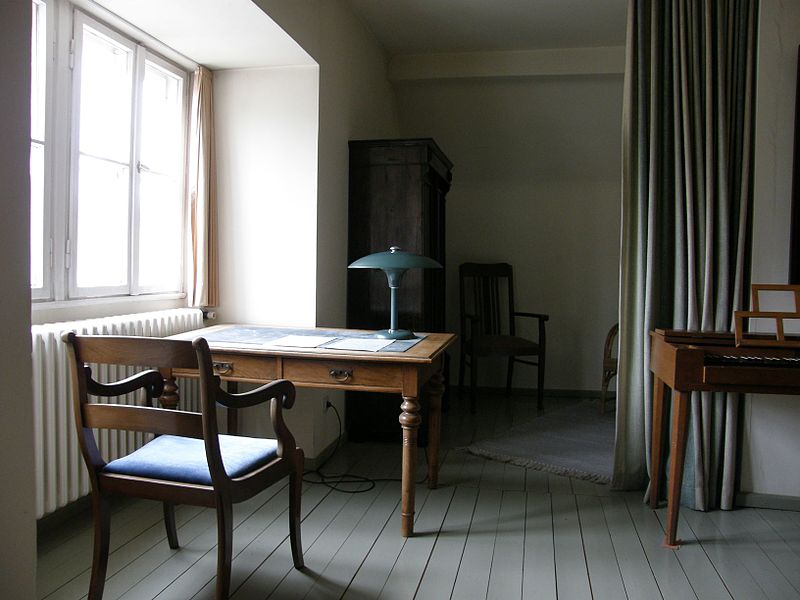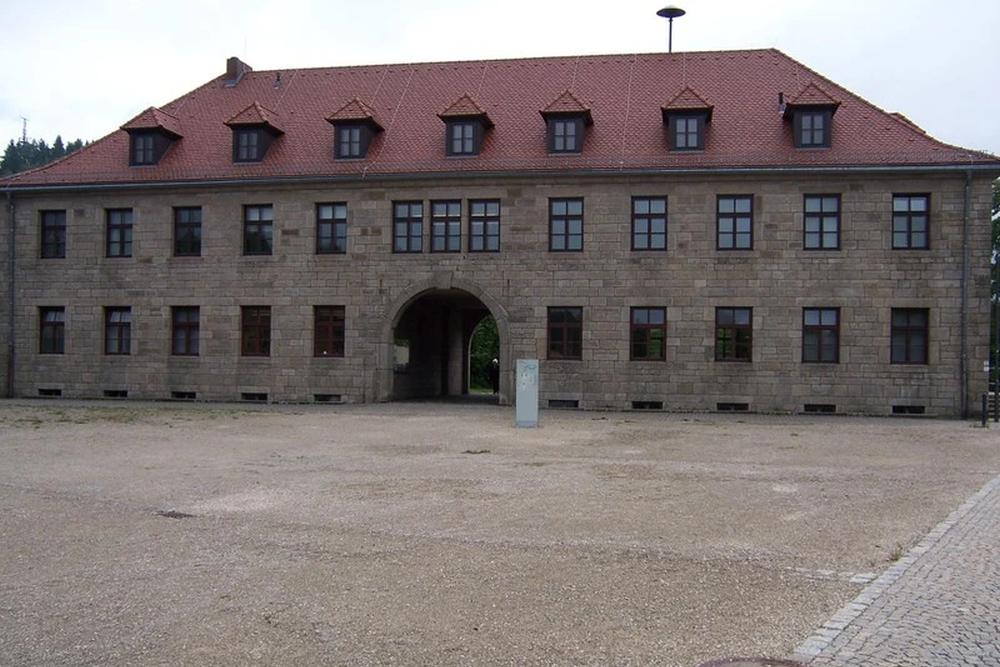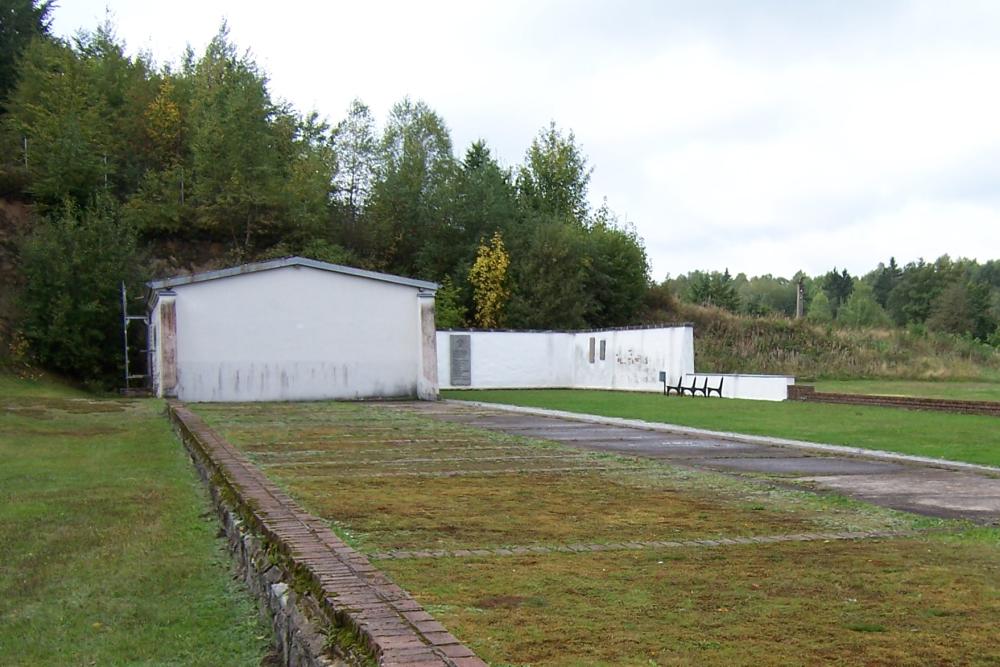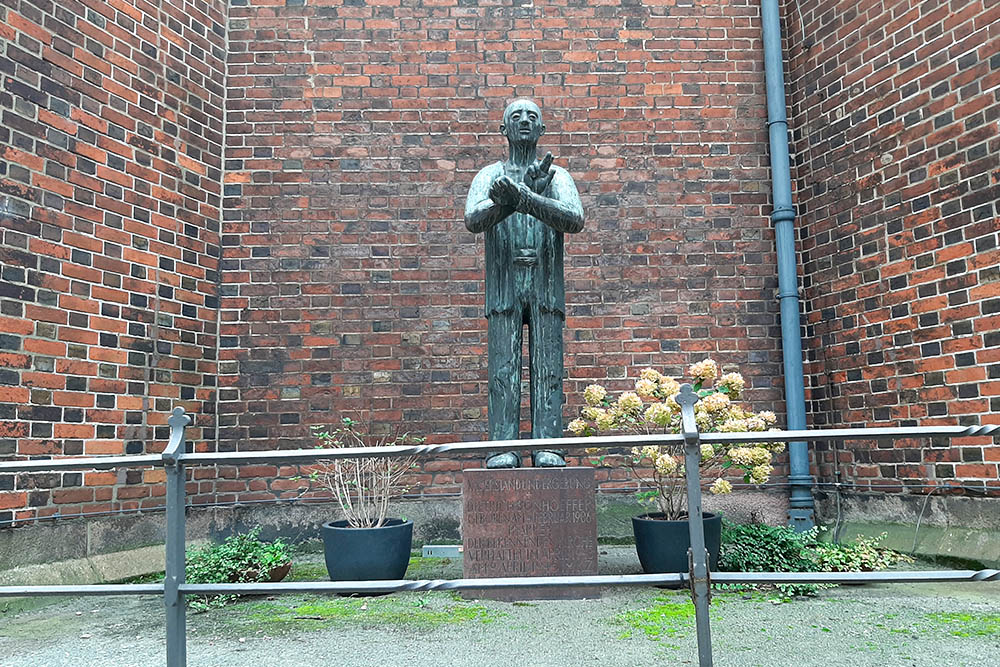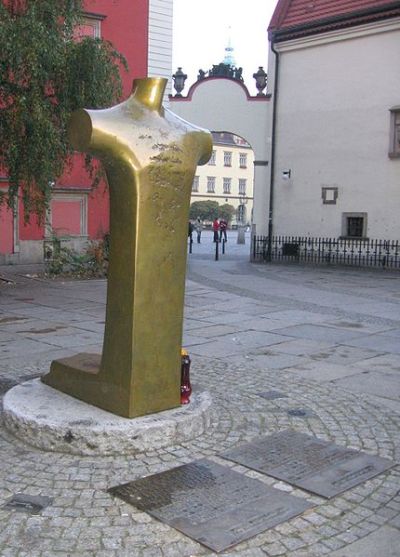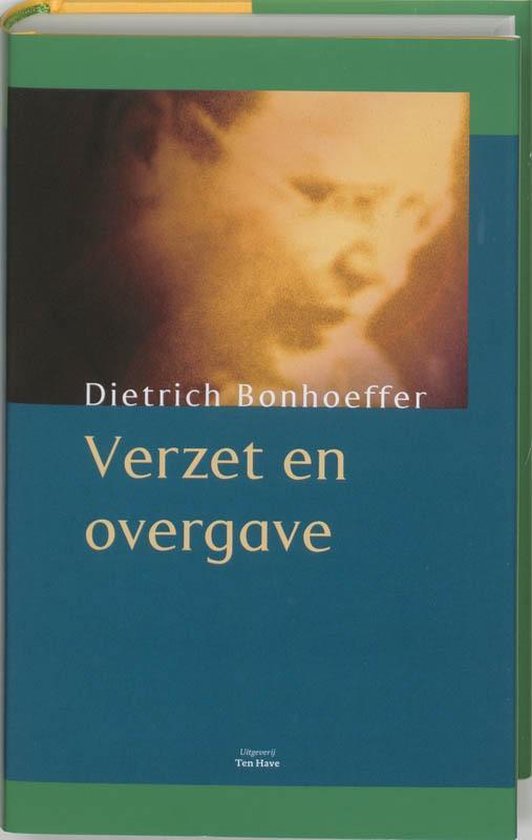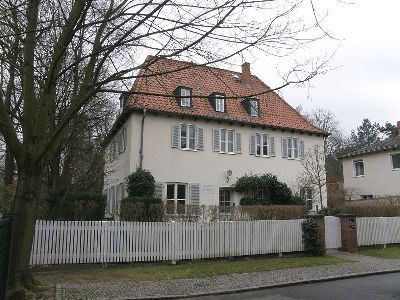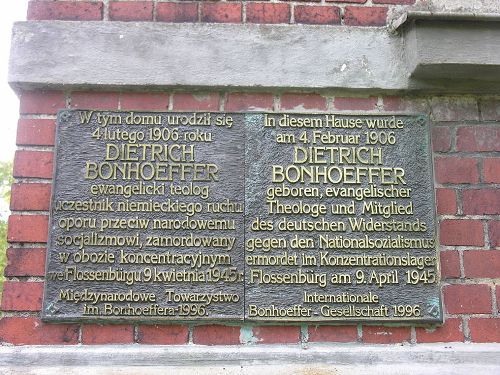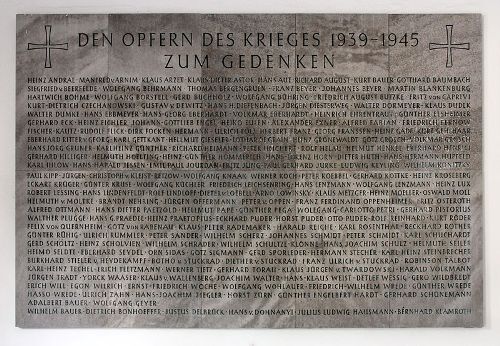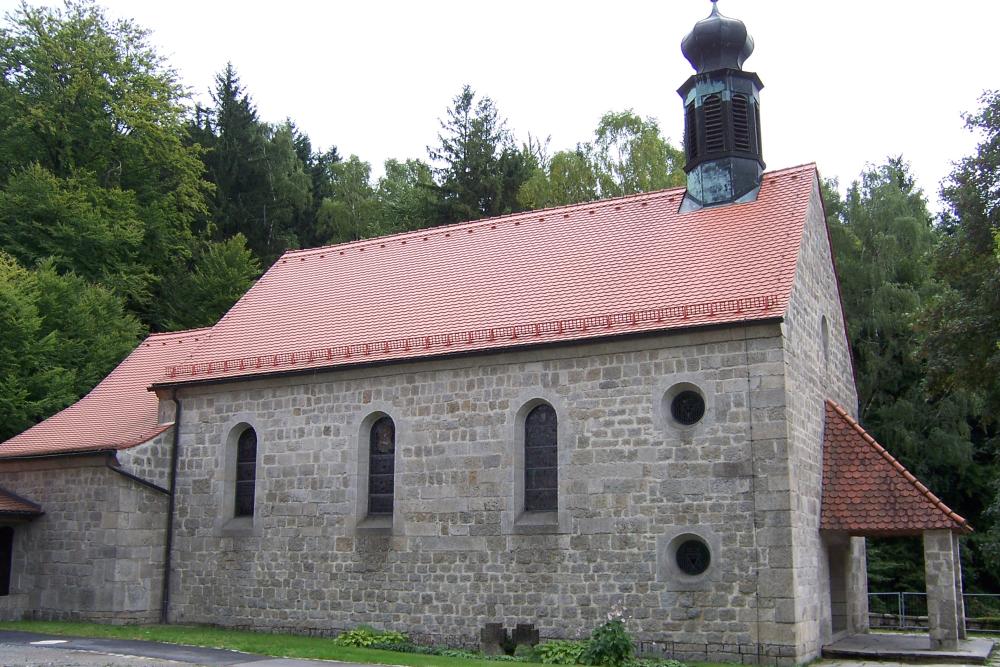Dietrich Bonhoeffer (1906-1945)
Introduction
On 5 April 1943 Dietrich Bonhoeffer was arrested and held in the house of detention at the Wehrmacht in Berlin-Tegel. The Gestapo indicted him on a charge of "Refusing military service and helping Jews to escape". At that time the trips abroad that Bonhoeffer undertook were only under suspicion. Who was this pastor?
Childhood and studies
Bonhoeffer and his twin sister Sabine were born on 4 February 1906. They were the sixth and seventh children out of eight in the Bonhoeffer household. The Bonhoeffers were a close-knit family of aristocrats and professors. Dietrich grew up during the First World War, a war that cost the lives of 2 million on just the German side alone. The Bonhoeffer family was not spared as three cousins and Dietrich’s brother Walter perished during the war. From an early age he knew that he wished to become a pastor. A choice that his brothers and sisters found peculiar as they were not very interested in the church. His mother on the other hand understood her son because her father was also a pastor. She was the one who, at his confirmation, presented young Bonhoeffer with the Lutheran Bible of his brother who had perished during the First World War. He kept this Bible with him at all times.
These sad family losses led Bonhoeffer to question the meaning of life. After the war, the situation in Germany was hopeless and the country was on the brink of civil war. In 1924 Bonhoeffer started his Theology studies at the University of Tübingen, but this did not mean that the future theologian was a Christian in heart and soul. That realisation came much later. Later that year together with his brother Klaus, who had recently graduated as a lawyer, he undertook a study trip to Rome from April to June, and there he became impressed by the liturgy.
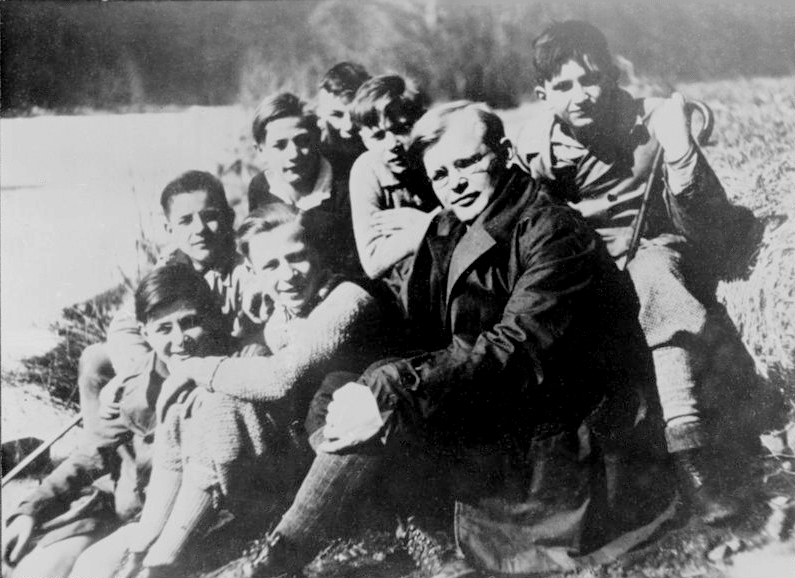
Dietrich Bonhoeffer with students in the spring of 1932. Source: Bundesarchiv, Bild 183-R0211-316 / CC-BY-SA 3.0
In 1927 he completed his doctoral dissertation on the social importance of the church as a community. Then he accepted an invitation to Barcelona, where he was especially interested in children’s service and youth work. In 1929, when Bonhoeffer was just 23 years old and had already obtained his degree as Doctor of Theology, he received his qualification to lecture at university. Although he was still too young to be ordained, he had a strong calling to become a pastor.
America
In 1930 he went to the United States on a study trip, where he met the French pastor Jean Lassette. Through him Bonhoeffer discovered the Sermon on the Mount, the sermon Jesus held on a mountain in Galilea, as written in chapters 5, 6 and 7 of the Gospel of St Mathew. Of course he did read the Bible, but only now did the meaning of those words register with him, thus intensifying the experience of his faith. Bonhoeffer had the feeling that he had now become a true Christian. For him this led to the start of the theme Nachfolge (act of following) that in 1937 would result in the book with the same title (The Cost of Discipleship in the English version). The change was already visible. In America Bonhoeffer was also confronted with racial hatred. For six months he attended the Sunday service in an Afro-American church in the Harlem district, and this made a profound impression on him. In 1931 he returned to Germany and started lecturing. At that time his fatherland was already on the brink of chaos. One year later he gave a lecture in which he promoted pacifism: "For a Christian any military service and preparation for war is forbidden". This pacifist line of reasoning originated partly under the influence of Ghandi, whom he admired greatly. Although it was his wish, the two men never met.
Build-up to WW2
By the end of January 1933, when Adolf Hitler became Chancellor [Reichskanzler], the whole Bonhoeffer family knew that war was coming. The following day he made a speech on the radio on the subject, "The Führer and the younger generation". However, this speech was forbidden, aborted and taken off the air. A few months later an appeal followed not to buy from Jews. Julia Bonhoeffer, Dietrich’s grandmother, refused to obey this order and kept buying her groceries in the usual shop where she used to buy. The Bonhoeffer family could hardly observe the new laws, excluding Jews from society. Bonhoeffer had to make a hard decision when he was asked to take care of the funeral of the father-in-law of his twin sister Sabine, who had died in April. Sabine’s husband was Jewish, although he hardly ever visited the synagogue. This was Bonhoeffer’s first confrontation with the question, "Do I resist or not?". The fact that Sabine’s children had all been baptised in the Christian church could not change the fact that Dietrich would be in breach of the law if he were to lead the funeral. An old religious provision forbade leading a funeral for people who had not been baptised. This provision had an extra meaning due to the upcoming National Socialism. It goes without saying that Bonhoeffer was a fierce opponent of the persecution of the Jews , but he did not dare to agree to his sister’s request just like that. Eventually he consulted the church authorities, who advised categorically against fulfilling the request in view of the unfavourable political climate. In the higher echelons of the church fear reigned from the beginning, which led to avoiding resistance against Hitler’s measures. Bonhoeffer obeyed his superiors, but did regret towards the end of the service that his fear had been stronger than his faith.
But there were more Jews in Bonhoeffer’s area, such as his good friend and confidant Franz Hildebrandt, his father’s Jewish assistants, a psychiatrist and professor in neurology. The persecution of the Jews in Germany was Bonhoeffer’s main motivation for political resistance.
The Confessing Church
Due to the Nuremberg Laws the "Aryan Paragraph" also came into effect. This paragraph meant that no people of "impure race" were allowed to preach. From then on Jewish Christians were excluded from participating in the church community. Bonhoeffer stated that the church had the responsibility to speak out and to remind the state about the boundaries of its authority. The church did not consider itself an advocate of Judaism . The general opinion was that the church should not interfere with business of the state. Bonhoeffer found such a statement shocking. He opposed this, but at first he did not get any support. He then left for London when offered the opportunity to lead two German church communities. There he met the German ambassador, Theodor Lang, who helped Bonhoeffer with activities for Jewish refugees. He also became more involved with bishop George Bell. In the meantime Bonhoeffer promoted pacifist resistance. He was of the opinion that Christians should never take up arms against each other -- an attitude for which he would never be forgiven. He lost his authority to lecture at the University of Berlin.
In 1935 the German Evangelical Church [Deutsche Evangelische Kirche], that had been formed by an forced amalgamation of the protestant churches in 1933, finally split apart. In September the Confessing Church was established, and Dietrich was requested to establish a seminary to train its own pastors. He agreed. What he especially wished to see reflected in this training was his conviction that following Christ and personally devoting yourself to Him was an indisputable must for any theologian and pastor. For Dietrich the church could only be the church if it was there for others. A suitable location was soon found: Finkenwalde. Here Bonhoefer realised something that was hardly imaginable within Protestantism -- "An attempt at restoring the evangelical community that he was missing within the church". He created a community life with a fixed schedule for the day including prayers and mediation, discussions and a free personal confession. He was reproached for leaning too much towards the Catholic concept of a monastic or convent community, although this was never his intention. He wanted future pastors to take part truly and fully in life in the true Christian meaning, and this required mutual support, fraternity, encouragement and sharpening each other’s minds. This seminar also led to his first meeting with Maria von Wedemeyer, his future fiancée. In September of that same year a Synod took place. During this meeting the Confession Church did not express itself about non-denominational Jews. It postponed its judgment until further notice. Bonhoeffer found this most regrettable, which ultimately led to his book The Cost of Discipleship [Nachfolge].
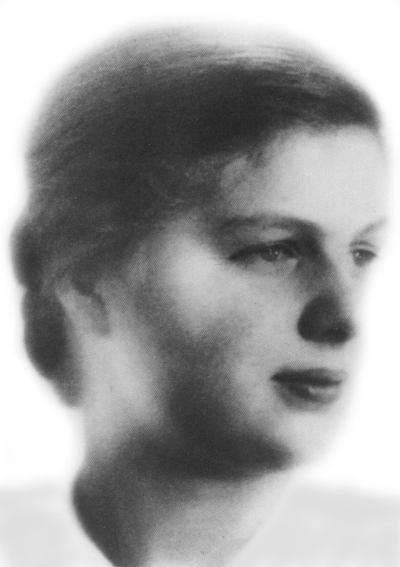
Maria Frederike von Wedemeyer, Dietrich Bonhoeffer’s fiancée at the age of 18 in 1942. Source: Dietrich-Bonhoeffer.net
The Confession Church also remained silent about the outburst of violence against the Jews during the night of 9 November 1938. This night would go into the history books as the Night of Broken Glass [Kristallnacht]. On this particular night, Nazis used brutal violence against the Jews. Shop windows were shattered and synagogues were set on fire. The church accepted this event as it was not a supporter of Judaism, but Bonhoeffer rejected this view. "Casting away the Jews from the Occident shall lead to disowning Christ, because Jesus Christ was a Jew". This he stated in this work Ethics. Bonhoeffer still wanted to remain the successor, as "the life of Christ on this earth had not yet come to an end. Christ lives on in the life of his successors," was his motto, which he also wrote down in his work ’The Cost of Discipleship’. This outlook gradually made him move away from the Confessing Church, as this church was less and less his. Hildebrandt and others were still working on a memorandum and discussed it with him. This document referred to anti-Semitism and also mentioned the existence of concentration camps. Nevertheless Hitler kept silent, as did the leaders of the Confessing Church.
Two of Bonhoeffer’s students then decided to have the memorandum published from abroad. Sometime later they were arrested. In 1937 around 27 of Bonhoeffer’s students were held in custody for a short or longer time. With Bonhoeffer’s help, Hildebrandt managed to escape to England. But Finkenwalde was closed down as a consequence of these arrests. Nevertheless Bonhoeffer managed to continue teaching for a while, although on a smaller scale. He also spread out the groups across a wider area, so that it was less obvious that he was teaching. On 20 April 1938 the Protestant Church forced all active pastors to swear an oath of allegiance to the Führer. As Bonhoeffer was no longer actively preaching, he managed to escape this oath. But he was facing another threat.
Resistance
In 1939 Bonhoeffer was called up to perform his military service, but would the Confessing Church keep on supporting him if he refused conscription? When he received an invitation to teach at universities in the United States, Bonhoeffer gratefully accepted this opportunity. In the meantime, thanks to his father, the conscription order was withdrawn. This enabled him to obtain the necessary papers to travel. But soon after that he was facing an inner conflict. He was wondering where he belonged now that so much misery was going on in his fatherland. The young vicars whom he had taught had to stay, while he was running. Isaiah’s proverb helped him to make a decision: "He who has faith, will not give way" (Isaiah 28:16). Bonhoeffer realised that he would have no right to help restore Christian life in Germany after the war if he had not shared the ordeals of his people. He accepted the risks he would be taking and returned to his fatherland after five weeks. In the following year, the training of young theologians in Finkenwalde was forbidden by the Gestapo once and for all. Bonhoeffer was also banned from speaking in public. From that moment he focussed on his work, Ethics; this also was an assignment for the church. But he would not remain underground for long.
The hardest decision for Bonhoeffer regarding whether or not to resist came during a conversation with Hans Oster and his brother-in-law Hans von Dohnayi (both working for the Abwehr). They suggested that Hitler should not only be deposed, but if necessary murdered. At first Bonhoeffer was shocked at hearing this. After all, as a witness to this remark, he was an accessory. Nevertheless he agreed to the plan. Later he would justify his decision as follows: "If a crazy men drives his car at breakneck speed down a busy street, then as a pastor I not only have to bury the dead and console the relatives, but I must also try to stop the driver."
Bonhoeffer started working for the Abwehr, the German military intelligence service headed by Admiral Wilhelm Canaris. Bonhoeffer engaged in counterespionage. His order was to "set up new connections with the Allies through the churches". For this purpose he travelled to Switzerland several times, where he tried to extend the connections through Bishop Bell and Willem Visser ’t Hooft of the World Council of Churches.
But Bonhoeffer did much more. On 19 September 1941 the regulation forcing Jews to wear a yellow star became effective. Bonhoeffer collected messages about transports of Jews and then passed them on to the military that were plotting against Hitler. At the same time Unternehmen 7 started. This project led by Admiral Wilhelm Canaris aimed to smuggle a group of 7 Jews, disguised as agents of the German counterespionage, to Switzerland. The group ultimately consisted of 15 Jews. Bonhoeffer was closely involved along with Friedrich Justus Perels, the legal counsel of the Confessing Church. Bonhoeffer wrote: "We are not Christ, but we do want to be Christians. This means that we have to open our hearts when the time comes, and Christ requires us to take action and face danger. Sitting and waiting passively and watching heartlessly are not Christian attitudes" (Letters and Papers from Prison, originally with the English title Resistance and Surrender). Bonhoeffer expressed his solidarity with all Jews, not only with those who had been baptised as Christians.
In 1942 he went on a journey with destination Norway, on which he joined Helmuth, Count von Moltke, the leader of the Kreisauer Kreis [Kreisauer Circle]. There Bonhoeffer encouraged the Norwegian Lutherans to continue their religious resistance. That year he also went to Switzerland for the third time, where he unexpectedly heard that Bishop Bell would be visiting Sweden. He then changed his destination to Sweden. This was an order by General Ludwig Beck, Chief of the General Staff, Hans Oster, and Hans von Dohnanyi. They wanted Bonhoeffer to ask the English government, that, if the planned coup took place, the new German government would be given the first chance to clean up the country. Bonhoeffer had their permission to pass on to Bishop Bell the names of all that would be involved in this. It proved to be a futile plan. Meanwhile, Bonhoeffer was somewhat more fortunate in his private life and had another encounter with Maria von Wedemeyer. In 1943 they would become engaged. But before this happened, the Abwehr had a crisis.
Arrest and conviction
Bonhoeffer was preparing for new travels when the crisis set in. Irregularities in foreign exchanges were discovered and arrests took place. The names of Dohnanyi and Bonhoeffer were mentioned, and it was said that the latter was "indispensable". This raised suspicion --a pastor who was indispensable to an actual military organisation such as the Abwehr. On 5 April 1943 Bonhoeffer was arrested, as were Hans von Dohnanyi and his wife Christine (a sister of Bonhoeffer), and also doctor Josef Müller and his wife Maria. Müller was the connection between the Abwehr and the Vatican. Initially Dietrich Bonhoeffer was accused of refusing to do military service, in accordance with §5 chapter 1 subsection 3 special regulation martial law, §74 of the criminal code.
Bonhoeffer was taken to Tegel prison, where life proved hard for him. He lacked soap and clean clothing and was put into solitary confinement. At the same time, the thought kept troubling him as to whether he would be able to endure the torture and interrogations without betraying his friends. He therefore even contemplated suicide as an alternative. Eventually he abandoned that thought and considered it a test he had to stand. The investigation against him was especially aimed at "Unternehmen 7", his travels, and his exemption from military service. Not until after the assault and coup of 20 July 1944 by Claus Schenk Graf von Stauffenberg was Bonhoeffer also charged with high treason and treason against the state. He then knew that he would never be released and resigned himself to his fate. There was an opportunity to escape, but he abandoned this plan when he heard that his brother-in-law Dohnanyi would be transported to the Sachsenhausen camp and that his older brother Klaus as well as his brother-in-law Rüdiger Schleicher had been taken prisoner. Bonhoeffer did not want his family to get into any further trouble, and more arrests would have been inevitable if he escaped.
Instead Bonhoeffer, who then had more freedom of movement, began relieving the burden of other prisoners by offering them assistance through conversations and mental care. His leading principle would remain the Sermon on the Mount from the New Testament, also during his imprisonment in Tegel. Bonhoeffer was of the opinion that one had to value life as a creation of God. For him it was not a question of "How do I become a hero after all this?" but "How will the next generation go on living?" "Only from this question, asked based on responsibility towards history, can solutions arise that will be fruitful, although initially they may not match our sense of honour", is what Bonhoeffer wrote in Resistance and Surrender. The Christian faith made him resist and also gave him the courage that was needed to join the resistance, and towards the end this made him resign himself to his fate. Thus he remained true to his guiding principle: to be a follower of Christ.
In February 1945 he was transferred to the Buchenwald camp and from there to Flossenbürg, where he was tried. In the early morning of 9 April the sentence for political high treason was carried out by hanging. Bonhoeffer was executed together with Hans Oster, Wilhelm Canaris and four other people.
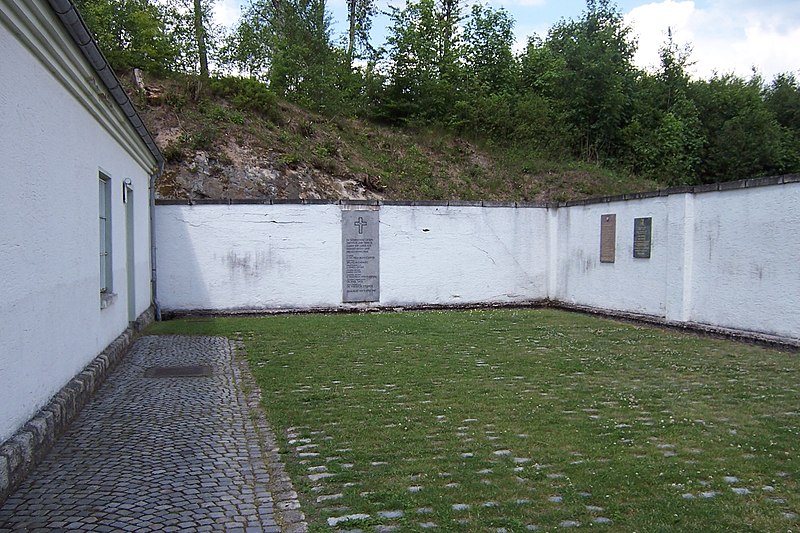
The courtyard of the Arrestblock (jail block) at the Flossenbürg concentration camp. The location where Dietrich Bonhoeffer was executed. On back wall there is a memorial plaque for the people that were executed on 9 April 1945 Source: Concordiadomi CC BY-SA 3.0
After his death
Bonhoeffer was not worshipped as a resistance hero immediately after his death, especially not by the church. The church stated that an attack such as the one on 20 July could never be approved for any reason whatsoever. The attack was a political matter and could not be justified from a religious-ethical point of view. The "Memorial book for the martyrs of the Confessing Church", that was compiled by the Brotherhood of the Lutheran Church in Germany, also stated that there was a difference: "There were members that resisted on political grounds and there were Christian martyrs, that resisted solely due the confession of the church." When on 6 April 1953 a commemorative plaque for Dietrich Bonhoeffer was unveiled at the church of Flossenbürg, the bishop of the state of Bavaria refused to attended for that same reason. In his opinion this involved a political martyr, not a Christian martyr. And then there was the election speech of Remer that took place in 1951.
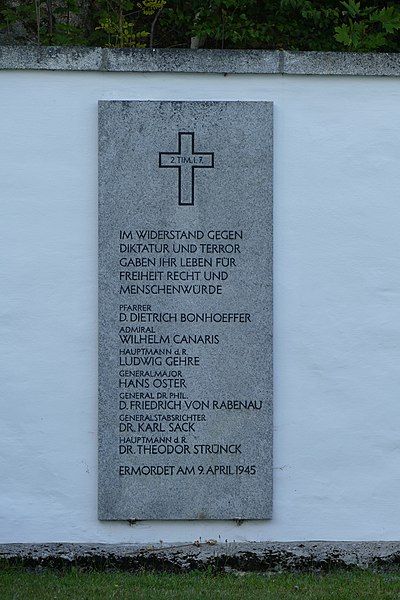
Flossenbürg concentration camp, Arrestblock-Hof: Memorial to members of German resistance executed on April 9, 1945. Source: Concordiadomi
Otto Ernst Remer had made his contribution as commanding officer of the Wachbataillon in Berlin. At the crucial stage he had made the attack of 20 July fail by choosing the side of the Nazis and then by making the arrests in the Bendlerblock. After the war Remer dedicated himself to the Socialist Reich Party, in succession to the NSDAP. During an election speech he stated: "These conspirators were mostly traitors to the country, paid by foreign countries. The time will come when we will be silent and ashamed to have taken part in the 20 July plot".
This went too far in the eyes of the Minister of the Interior at that time, and complaints were raised because of slander and defamation in memory of the deceased. Two Lutheran theologians, Iwand and Wolf, were consulted. They came to the following conclusion: "From a Lutheran religious view the men of the 20 July plot can at most be reproached for taking action too late." This proved to be a turning point for the esteem in which Bonhoeffer is now held.
Definitielijst
- Abwehr
- Term used for the German military intelligence unit during the WW1 and WW2. From 1935 onwards under command of Admiral Wilhelm Canaris. The organisation often came into conflict with other secret services such as the SD and the Gestapo. During World War 2 under Canaris frequently a source for conspiracies against the Nazi regime until in 1943 a major conspiracy by a number of prominent members of the Abwehr was discovered and the Abwehr was placed under command of Himmler. After the assassination attempt on Hitler in 1944, Canaris was discharged and the Abwehr was dissolved. The conspirators and Canaris were prosecuted and in 1945 they were executed atc oncentration camp Flossenburg.
- Confessing Church
- German: Bekennende Kirche. Movement for revival within the German Protestant churches that developed during the 1930s from their resistance to Adolf Hitler’s attempt to make the churches an instrument of National Socialist (Nazi) propaganda and politics.
- First World War
- Took place from 1914 till 1918 and is also named The Great War. The conflict started because of increased nationalism, militarism and neo-colonialism in Europe. Two alliances battled one another during the 4-year war, which after a dynamic start, resulted into static trench warfare. The belligerents were the Triple Alliance (consisting of Great-Britain, France, and Russia; later enlarged by Italy and the USA, amongst others) on the one hand and the Central Powers (consisting of Germany, Austria-Hungary, Bulgaria and the Ottoman empire) on the other hand. The war was characterized by the huge number of casualties and the use of many new weapons (flamethrowers, aircraft, poison gas, tanks). The war ended in 1918 when Germany and its allies surrendered unconditionally.
- Führer
- German word for leader. During his reign of power Adolf Hitler was Führer of Nazi Germany.
- Jews
- Middle Eastern people with own religion that lived in Palestine. They distinguished themselves by their strong monotheism and the strict observance of the Law and tradition. During World War 2 the Jewish people were ruthlessly persecuted and annihilated by the German Nazis. . An estimated 6,000,000 Jews were exterminated.
- Judaism
- Monotheistic religion developed among the ancient Hebrews.
- Kreisauer Kreis
- Was a group of about twenty-five German dissidents led by Helmuth James von Moltke, who met at his estate in the rural town of Kreisau, Silesia.The circle was composed of men and a few women from a variety of backgrounds, including those of noble descent, devout Protestants and Catholics.
- martial law
- Military government, involving the suspension of ordinary law .
- National Socialism
- A political ideology drawn up by Hitler based on the superiority of the German race, the leader principle and fierce nationalism that was fed by the hard Peace of Versailles. National socialism was anti-democratic and racist. The doctrine was elaborated in Mein Kampf and organised in the NSDAP. From 1933 to 1945 National socialism was the basis of totalitarian Germany.
- Nuremberg Laws
- Laws promulgated by Hitler on the party convention on 15 September 1935. These laws alter alia included regulations about marriage and intercourse between Jews and non-Jews. Jews were deprived of German citizenship. Also known as the racial laws.
- persecution of the Jews
- "Judenverfolgung", action imposed by the Nazis to make life hard for the Jews, to actively persecute them and even annihilate them.
- resistance
- Resistance against the enemy. Often also with armed resources.
- Socialism
- Political ideology aiming at slight or no class differences. Means of production are owned by the state. Evolved as a response to capitalism. Karl Marx tried to substantiate socialism scientific.
- synagogue
- Jewish house of prayer.
- Wehrmacht
- German armed military forces, divided in ground forces, air force and navy.
Information
- Article by:
- Annabel Junge
- Translated by:
- Liesbeth Vrieze-Risseeuw
- Published on:
- 19-01-2025
- Feedback?
- Send it!
